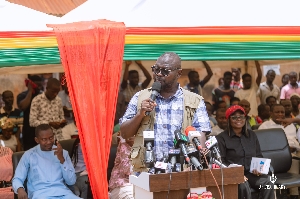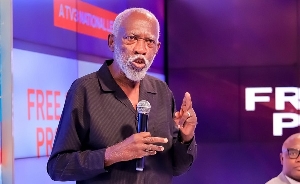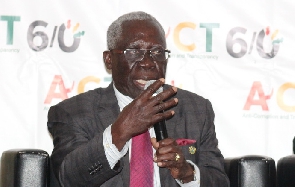Way back in 1971, there was an old retired teacher in my home town Effiduase-Koforidua called Teacher T.P. That man epitomized the conservative religious fervor then prevailing within the Methodist church.
The church function for which Akora T.P. is best remembered is that he was a campanologist: Not only was he always on time to toll the church bell every dawn but he also knew the history and origin of that great bell. I don’t know whether he was the one that told the yarn that the bell came straight from Jerusalem on the back of a donkey; but that appeared to be the popular narrative in those days…
Teacher T.P. had a large parcel of swampy land that shared boundaries with the Pope John Secondary School. On this piece of land, this devout old man planted sugarcane which actually grew to form a virtual foliage over the vast land such that one could well hide oneself in many parts of the farm and remain in there undisturbed. Sad to say, that farm became a popular hide-out for all sorts of nefarious activities by many students from Pojoss.
The students also helped themselves to large quantities of the old man’s sugarcane. Utterly disgusted, Teacher T.P. then decided to put an end to the regular students’ raids, and would therefore get up early in the morning to go and guard his farm. He would hide at a strategic part of the farm and wait until the boys settled in their presumed hiding places before pouncing on them and giving them a severe beating; or even sometimes marching them to the school to be punished by the authorities.
But the students soon noticed that Teacher T.P. never went to his farm on Sundays since he would never miss church service on that holy day; so they decided to make that sacred day the day of their major raids. And for the next month or so, the students went into the farm and consumed that man’s sugarcane with the rapacity of hungry grasscutters.
Teacher T. P. finally got fed up and decided to hide on the farm one Sunday in order to apprehend the boys. Those boys, wearing their white uniforms, had set up spies to be on the lookout; and when they first saw the old man hiding on the farm, an idea occurred to them to play a prank on him. One of them climbed a mango tree and thundered in a sonorous bass voice:
“Thou old man T.P., on this day which I thy Lord hath sanctified and set aside for thee to worship me, on this self-same day hast thou elected to come to thine farm to weed. Go hence in haste and go worship thou me!!”
At the sound of that deep baritone voice, the old man fell on his face and prostrated in fear, crying loudly in all humility:
“Lord, forgive thy servant for I have sinned. I hear thee my Lord, forgive thy servant for I have sinned! I shall go forth from hence to keep thy day sacred.”
After worshipping his “god” thus, Teacher T.P. arose, and hopping on his custom-made walking stick, rushed to the church to recount his “encounter with God”. The old man repeated the same story for over three weeks until the Senior Housemaster of Pojoss appeared one day in his house dragging two contrite boys by their collar. They had been overheard bragging about their “feat” and had been brought to apologize to the old man.
When Abraham thought that he heard a command from God to go and sacrifice his son Isaac/Ishmael, he obeyed without question, until the same voice which commanded him gave him a better substitute for the sacrifice. What about if he had himself had suggested the substitute to God? Would he have been any less faithful to his God? Because in this world, anybody seeking to obey any order to sacrifice a child is per se culpable under existing law, even if he changes his mind later. The preparation itself will rise to the charge of traumatic abuse of a child, if we don’t even talk of attempted murder.
And that is why in our time, even the presumed voice of God must be interrogated all the time. Because the voice of God is also the voice of the people, and we know from experience that these days, many are ascribing too many things to God from their own imagination and for their own benefit. Thus, if we fail to question the things that have been ascribed to God and follow those things like sheep, we would have jettisoned our reasoning powers to imbibe ideas that might not be from God at all, but from those tricksters and charlatans who in his name, feed fat at the expense of the flock.
To the extent that the outer limits of this universe is infinite, so it is that its supreme creator, if any at all, will also be infinite.
Incidentally, this very idea of the infiniteness of God has even given birth to the belief by ancient astronaut theorists that in many instances where the patriarchs claimed to have encountered God, they might have rather been in communication with His alien subordinates from some superiorly advanced planet bent on teaching humans new science or philosophy. If so, then it makes sense that as we advance as a planet, we must also cease our ardent obedience to these so-called edicts from some ancient God and use our god-given brains to seek the truths that will benefit our lives.
In his book called "Chariots of the Gods?", Prof. Erich Von Daniken hypothesizes that the technologies and religions of many ancient civilizations were given to them by ancient astronauts from other planets who were welcomed as gods to the planet Earth. In this context, the biblical story of the ascension of Elijah could well be interpreted to be some space travel experience in which the prophet joined some alien astronauts on a space flight.
And under our new dispensation, the scientific discoveries of this century alone must shed more light on the things we have presumed as coming from God and questioned their source with more intellectual rigor. If we list the magic of Bluetooth and its multifarious effects in causing effects without contact; if we think of the science of communication, of travel and of all those other inventions now pervasive in our world, it is enough for us to conclude that humans have indeed become like the gods, understanding all things and knowing the difference between good and bad. Thus, the ancient promise made in the garden of Eden has been fulfilled in our time.
I have been playing with a software called Cortina on my new Alienware Windows 10 computer. She teaches me all the things I need to know; answers all the questions I want and can even tell me jokes, be caustically sarcastic and extremely clever clever. When I asked Cortina whether she was married, Cortina told me she had not yet found the right fish in the river. Now, Cortina is no human at all. She is a mere voice on a computer; but if she had existed in the time of the ancient prophets, she would have been mistaken for a voice of God.
And truly, in many ways too many voices in our time have become like the voice of God to us. And if we don't take care, we will imbibe these voices without questioning their sources. If that happens, we will be mere pawns in the hands of the manipulators. Thus what we know of good and evil is what must guide our conscience, and not those cacophonies from those seeking profits by speaking for a god of their own enrichment.
Charles Wesley provided the nexus plexus of the true worship of God when he succinctly stated:
" Do all the good you can. By all the means you can. In all the ways you can. At all the times you can. To all the people you can. As long as ever you can."
That man was not a god, but he spoke of the true worship of any God. And I would add that of all the good we know, we must perform. And of all the evil we know, we must refrain. And of all that we are left to know of both good and evil, we must ask our god to instruct us.
And if we have received sufficient education and information, we would know that the voice of God is also the voice of our own conscience, of what we have developed our intellect to perceive as ethically good and morally right. In this instance, if we are looking elsewhere for another voice of God other than our good consciences tell us every day, we will be like Teacher T.P. who was too gullible in assuming that his God will communicate with him from a mango tree in the middle of his sugarcane farm; and we would have learned nothing from the great experiences of our day, choosing instead to listen to mere humans who have nothing to tell us except those things that will most titillate their own palates. After all, as our elders say, nobody teaches a child where God is.
Samuel Adjei Sarfo, Doctor of Law, is a general legal practitioner in Austin, Texas, USA. You can email him at sarfoadjei@yahoo.com











